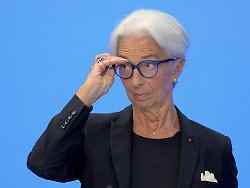struggle for credibility
ECB prepares interest rate hammer
By Jan Ganger
09/03/2022, 06:10 am
Inflation shoots up. The European Central Bank has not yet got the price increase under control. It could therefore follow up with an interest rate hike unprecedented in its history.
The European Central Bank has to choose between the plague and cholera: In the euro zone, inflation threatens to get completely out of control. At the same time, the economy is weakening. So if the ECB raises interest rates sharply in order to bring general inflation under control, it could stall the economy.
But soaring inflation leaves central banks with no other choice. They will hike interest rates at their next meeting next Thursday. The only question is how big the rate hike will be. In August, inflation in the euro zone picked up speed again and is now at 9.1 percent. This is the highest level since the introduction of the common currency.
For a long time, the ECB, led by Christine Lagarde, shied away from raising interest rates. She had assumed that the high inflation rates would go away on their own because the two main causes were temporary: the disrupted supply chains would soon mend themselves, and at the end of the heating season energy prices would fall as demand decreased. The logic behind this: Higher interest rates neither repair supply chains nor make oil cheaper. Instead, they slow down the economy.
But things turned out differently. Energy prices are going through the roof because of the Russian war of aggression in Ukraine as the next heating season approaches. China’s strict zero-Covid strategy keeps disrupting global supply chains. Worse still, fears are growing in the eurozone that high inflation is here to stay. Should this expectation take root across the board, the ECB will have a big problem. Because then a wage-price spiral can get underway.
Workers across all industries then give up their restraint and push through higher wages, assuming that inflation will not return anytime soon. Companies raise prices to compensate. As a result, the general price level continues to rise, creating a chain reaction.
“Heavy interest rate hike”
Against this background, the ECB pulled the emergency brake in July and ended the zero interest rate policy. Despite the surprisingly high rate hike of 0.5 percentage points, the price pressure is not abating. A survey by the ECB published on Friday is likely to worry central bankers: consumers’ long-term inflation expectations have risen and are well above the ECB’s inflation target of 2 percent.
The central bankers therefore feel compelled to show determination. “In this environment, the central banks must act vigorously,” said Fed Director Isabel Schnabel last weekend at a symposium of the US Federal Reserve in Jackson Hole. “The longer inflation remains high, the greater the risk that the public will lose confidence in our determination and ability to maintain purchasing power,” said the economist. If a central bank underestimates the stubbornness of inflation – according to Schnabel, most central banks have done this in the past year and a half – and only changes its monetary policy slowly, the consequential costs can be considerable.
If the ECB fears for its credibility, it is likely to make an interest rate hike of 0.75 percentage points on Thursday – it would be bigger than ever in its history. For a long time, the financial markets had assumed 0.5 percentage points. But after several central bankers called for a “heavy rate hike” in the run-up to the meeting, more and more analysts and market players are expecting a more significant increase. The ECB accepts the risk of dealing a severe blow to the economy and plunging the euro zone into recession. The calculus: if it gets inflation under control, it will be spared further interest rate hikes.
